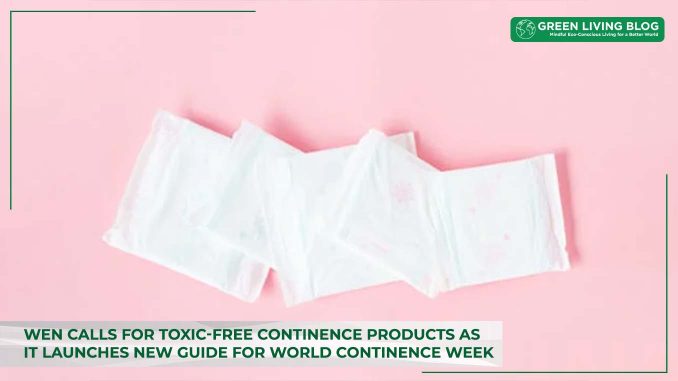
Wen (The Women’s Environmental Network) is calling for the effective regulation of toxic-free continence products this World Continence Week, 17-23 June 2024.
With the launch of its new resource ‘Stress incontinence is no laughing matter!’, the charity aims to raise awareness of the prevalence of stress and other types of urine incontinence, encouraging those who experience it to seek help and providing information on safe, affordable, and reusable products to use.
Whether it’s bladder leaks or urge incontinence, stress incontinence is extremely common. It is estimated that one in four of us will have an issue with bladder control at some point in our lives, and one in 10 will have problems with bowel control. However, the culture of silence around incontinence affects our understanding of continence problems, as well as our knowledge of treatments and choice of continence products. This has implications for our health and the environment.
Testing by independent organisations has found levels of toxic chemicals in continence products in worrying amounts. Ingredients, like fragrance and something listed on packaging as ‘Odour Lock technology’, can cause irritation and health issues.
Because it’s trademarked we are not entitled to know what it contains. In addition, and the presence of indicators of harmful ‘forever chemicals’ or PFAS as well as concerning substances like 1.4 Dioxane are a worry given its carcinogenic properties.
Wen’s Expert Adviser Helen Lynn says:
“Although continence products are regulated like period products, there is no indication on the label as to what they contain. The cocktail of chemicals found in continence products, even in small amounts, are placed next to one of the most absorbent parts of the human body. Considering that women and people who menstruate can also be exposed to similar levels of toxic chemicals through single use period products, along with any continence products they use on a daily basis, we urgently need regulation for all incontinence products, as well as transparency as to what ingredients are in these products.”
The waste and environmental implications
With over one billion continence products bought in the UK each year, and the use of adult continence products growing by over 50 per cent in the last five years, it amounts to an awful lot of waste.
Helen Lynn adds:
“With landfill space running out and toxic emissions from incineration making it less than a healthy choice for waste management, a shift to washable pads and pants could save money and benefit health and the environment.”
So, what can we do?
The only way to break the taboo is to open the discussion around stress and other continence problems:
- If you experience incontinence see your GP, local NHS continence service or an independent physiotherapist
- Do your pelvic floor exercises, the good thing is no one knows you are doing them so you can practise anywhere
- Consider using washable products instead of disposables – you could save money and prevent a lot of waste even if you only use them at night or at home
- Don’t flush your disposable pads down the toilet. ‘Bag it and bin it’ and think before you flush
- Demand the best products for yourself and the environment
- Some people may be eligible for free continence products and should demand the best
- If you or a relative are in residential care, request a choice of reusable products
- Tell retailers if your needs are not being met in the high street
- Give a copy of Wen’s resource to your GP, continence advisor, midwife, ante-natal or postnatal instructor, care manager
- Become a friend of Wen to support its work and campaigns
– Ends –
![]()
Author Profile

- Always on the hunt for the latest green living news, tips and stories, proudly sharing them with readers all around the world to make this planet a better place.
Latest entries
 Green Business NewsMarch 12, 2025WindsorPatania Architects’ game-changing Virtual Reality Education Project XR Lab takes Top Award
Green Business NewsMarch 12, 2025WindsorPatania Architects’ game-changing Virtual Reality Education Project XR Lab takes Top Award DictionaryFebruary 11, 2025What is the Meaning of the Term “Green Living”
DictionaryFebruary 11, 2025What is the Meaning of the Term “Green Living” Green News ReleasesJanuary 30, 2025Stand Up Pouches: What to Know about Flexible Packaging for Sustainable Brands
Green News ReleasesJanuary 30, 2025Stand Up Pouches: What to Know about Flexible Packaging for Sustainable Brands DictionaryJanuary 11, 2025What is the Meaning of the Term “Guest Post”
DictionaryJanuary 11, 2025What is the Meaning of the Term “Guest Post”





Leave a Reply
You must be logged in to post a comment.